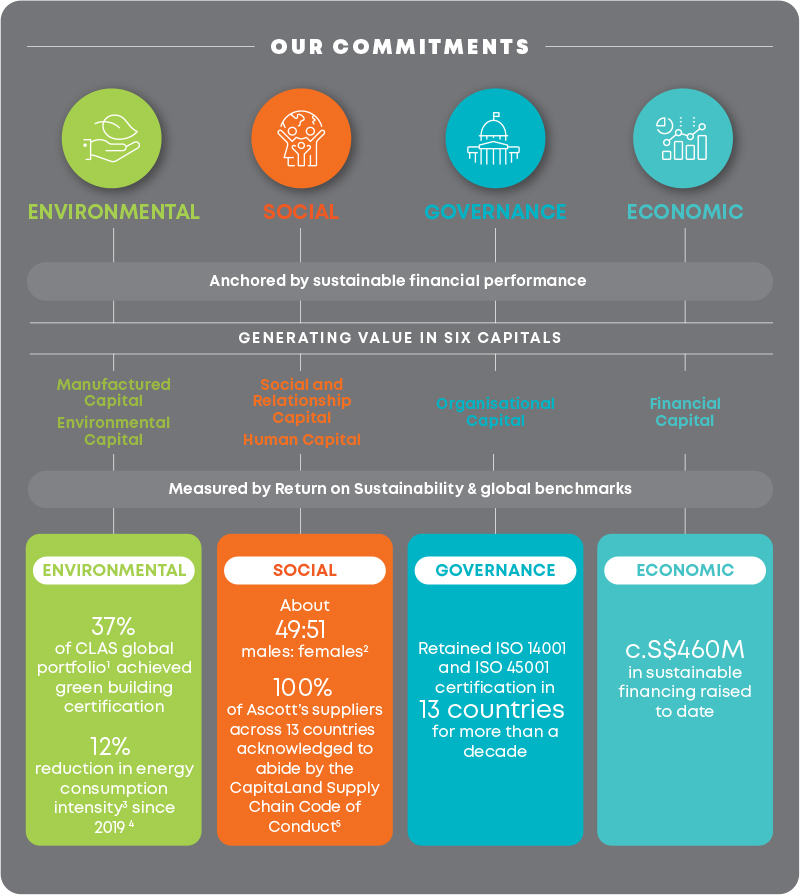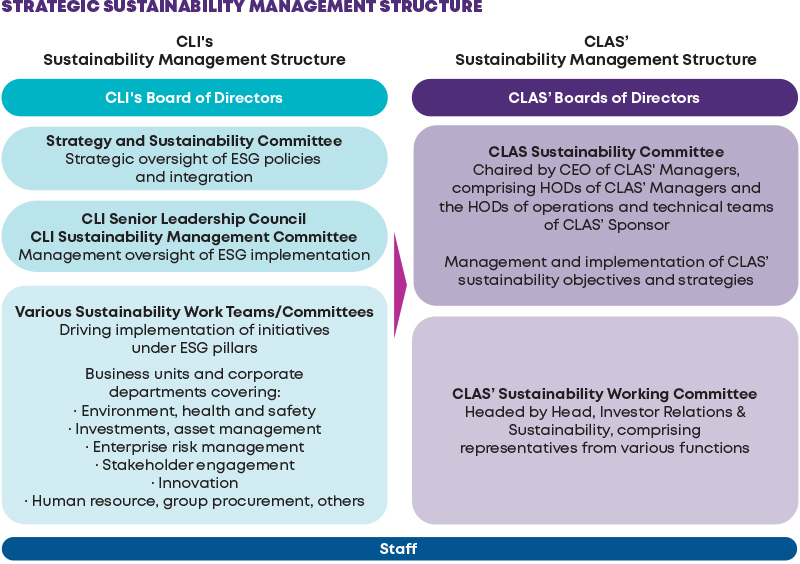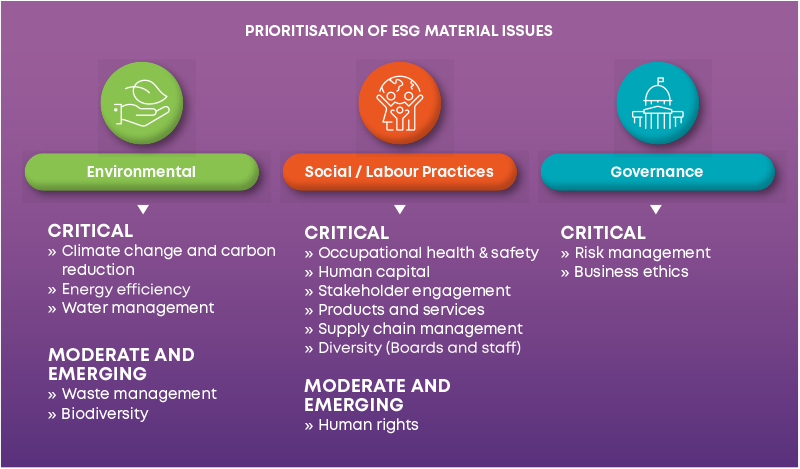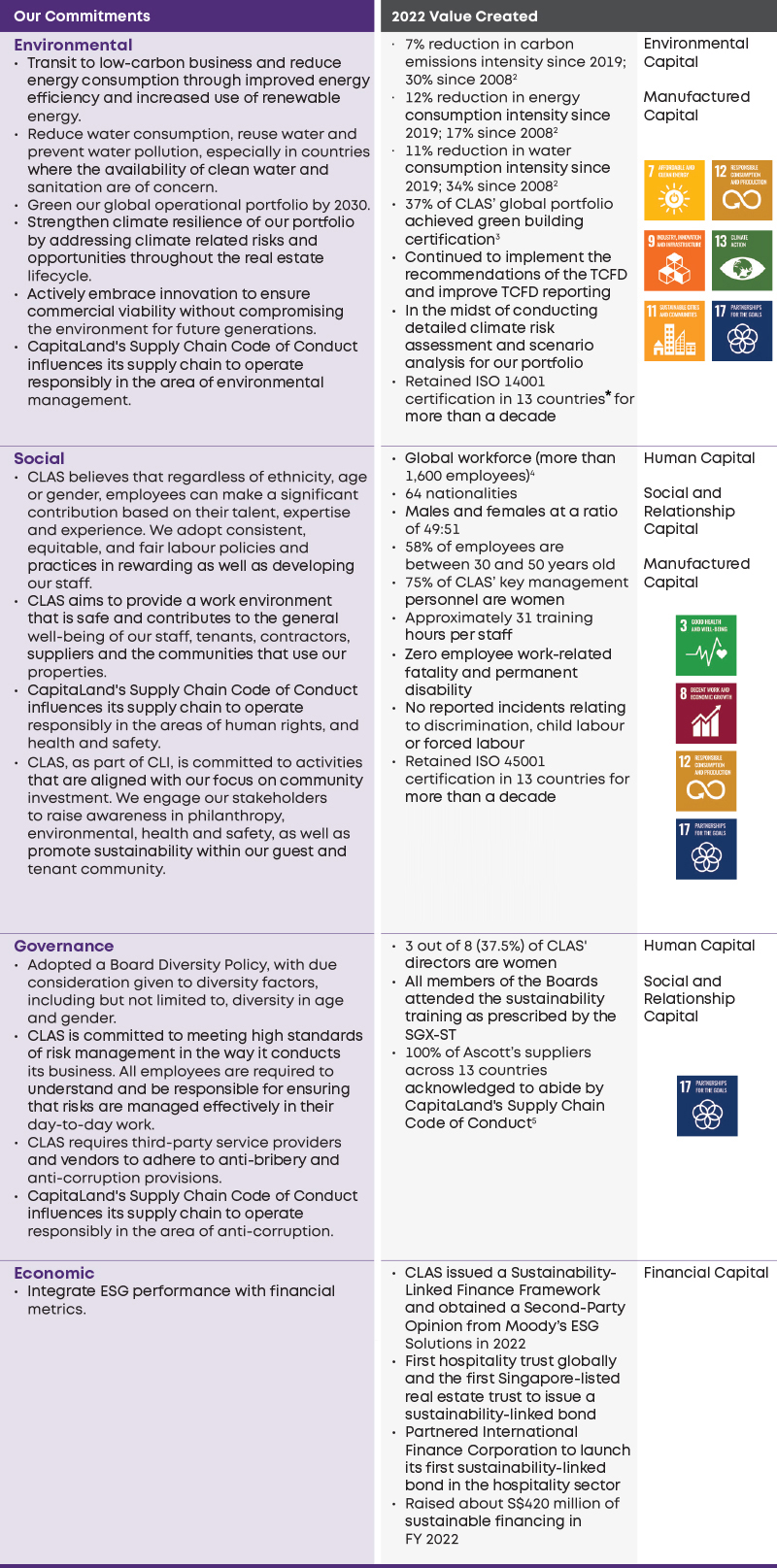
Download Sustainability Report (6.1 MB)
As at 31 December 2022, there were 103 operational properties and 2 properties under development in CLAS’ portfolio. 52 of the operational properties were managed by CLAS’ Sponsor during the period under review, and the environmental performance of 51 properties (excluding Riverside Hotel Robertson Quay which was earmarked for asset enhancement), which are deemed to be under operational control, have been covered in this Report. For FY 2022, the 51 properties contributed 43.5% of total revenue.
The environmental performance of the remaining 51 properties, while not being reported, is being tracked and monitored internally.


2021 and 2022 Global Real Estate Sustainability Benchmark
Global Sector Leader (Listed – Hotel)
CapitaLand Investment 2030 Sustainability Master Plan
The Managers are part of CapitaLand Investment Limited (CLI) and our sustainability strategy is aligned to that of CLI.
CLAS is aligned with the CapitaLand Investment 2030 Sustainability Master Plan unveiled in 2020 to elevate our commitment to global sustainability in the built environment. The Sustainability Master Plan drives CLI's sustainability efforts in the ESG pillars, enabling CLI to create a larger positive impact for the environment and society.
For more information on the CapitaLand Investment 2030 Sustainability Master Plan, please click here.
Ascott CARES
CLAS also aligns its sustainability goals with its Sponsor, The Ascott Limited (Ascott). Ascott is a wholly-owned subsidiary of CLI and it is one of the leading international lodging owner-operators. Ascott’s portfolio spans over 220 cities across more than 40 countries in Asia Pacific, Central Asia, Europe, the Middle East, Africa, and the USA.
Ascott’s sustainability programme, Ascott CARES, is a Global Sustainable Tourism Council (GSTC)- recognised programme centred around five fundamental pillars of Community, Alliance, Respect, Environment and Supply chain.
For more information on Ascott CARES, please click here.

1 Refers to the gross floor area of CLAS' properties by m2, as at 31 December 2022.
2 Computation of workforce statistics are based on employees of CLAS' Ascott-managed properties and the Managers of CLAS.
3 Computation of intensity data is for 2022 and excludes new properties which are in operation for less than 12 months,
properties undergoing asset enhancement programmes and third-party operated properties.
4 In 2022, CLAS’ energy consumption intensity was a 17% reduction from the 2008 baseline.
5 As part of their new and renewed contracts.
At CLAS, sustainability is at the core of everything we do. We are committed to growing in a responsible manner, delivering long-term economic value, and contributing to the environmental and social well-being of our communities. CLAS' material environmental, social and governance (ESG) factors are aligned with CLI's 2030 Sustainability Master Plan, and reviewed by the CLAS’ Boards together with management every two years.
The CLI 2030 Sustainability Master Plan steers our efforts on a common course to maximise impact through building a resilient and resource efficient real estate portfolio, enabling thriving and future-adaptive communities, and accelerating sustainability innovation and collaboration. Ambitious ESG targets have been set which include carbon emissions reduction targets validated by the Science Based Targets initiative (SBTi).
CLAS’ Boards are responsible for overseeing CLAS’ sustainability efforts, and take ESG factors into consideration in determining their strategic direction and priorities. The Boards also approve the executive compensation framework based on the principle of linking pay to performance. CLAS’ business plans are translated to both quantitative and qualitative performance targets, and executed through sustainable corporate practices.
CLAS’ Boards recognise the importance of sustainability as a business imperative, and ensure that sustainability considerations are factored into CLAS’ strategy development.
On a regular basis, the Boards are updated on the sustainability management performance of CLAS, key material issues identified by stakeholders, and the planned follow-up measures. Additionally, the Boards are updated quarterly and at ad hoc Board meetings on matters related to sustainability risks, and relevant performance metrics, including carbon emissions performance, progress on achieving the reduction targets, green certification, human capital development, as well as stakeholders’ expectations on climate change and/or other social matters. They are also informed of any work-related safety incidents, business malpractice incidents and environmental incidents, which may include climate-related damages or disruptions.
In 2022, to strengthen its sustainability stewardship, CLAS formalised a Sustainability Committee which comprises the CEO and Heads of Department of CLAS’ Managers, and the Heads of Department of the operations and technical teams of its Sponsor.
A Sustainability Working Committee was also formed to provide support to the Sustainability Committee.
At CLI, the Strategy and Sustainability Committee (SSC), a Board Committee chaired by CLI’s Lead Independent Director, is responsible for overseeing CLI’s sustainability strategies and goals, including providing guidance to Management and monitoring progress against achieving the goals of sustainability initiatives. The SSC typically meets twice a year, with additional meetings convened as necessary.
CLI’s sustainability work teams comprise representatives from CLI business units and corporate functions. Each business unit also has its own Environmental, Health and Safety (EHS) Committee to drive initiatives in countries where it operates with support from various departments.

CLAS has a regular review, assessment and feedback process in relation to ESG topics. Key to this is an annual Group-wide Risk and Control Self-Assessment exercise which entails the identification, assessment and documentation of material risks and corresponding internal controls. These material risks include fraud and corruption, environmental risks including climate change, health and safety risks, and human capital risks which are ESG-relevant.
Guided by CLI's 2030 Sustainability Master Plan, CLAS elevated its commitment to global sustainability in the built environment, identifying and reviewing material issues that are most relevant and significant to us and our stakeholders. These ESG material issues are assessed and prioritised based on the likelihood and potential impact of issues affecting business continuity of CLI, which CLAS is part of. For external stakeholders, priority is given to issues important to the society and applicable to CLI and CLAS. For more details on stakeholder engagement, please refer to the Stakeholder Engagement section under the Social and Relationship Capital chapter of CLAS’ Sustainability Report 2022.

The material ESG issues and the value created, aligned to CLI's 2030 Sustainability Master Plan focus areas and commitments1, are mapped to six integrated reporting Capitals – Environmental, Manufactured, Human, Social and Relationship, Organisational, and Financial. This is further mapped against eight UN SDGs that are most aligned with CLI's 2030 Sustainability Master Plan focus areas, and where CLAS can achieve the greatest positive impact.
The UN SDGs call on companies everywhere to advance sustainable development through the investments they make, the solutions they develop, and the business practices they adopt. In doing so, the goals encourage companies to reduce their negative impacts while enhancing their positive contributions to the sustainable development agenda.

1 The CLI 2030 Sustainability Master Plan is regularly reviewed where necessary to complement the Group’s business strategy and align
with climate science. The first scheduled review was in 2022.
2 Computation of intensity data is for 2022 and excludes new properties which are in operation for less than 12 months, properties
undergoing asset enhancement programmes and third-party operated properties. The baseline for CLI 2030 Sustainability Master
Plan has been changed from 2008 to 2019.
3 Refers to the gross floor area of CLAS’ properties by m2
,as at 31 December 2022.
4 Computation of workforce statistics are based on employees of CLAS' Ascott-managed properties and the Managers of CLAS.
5 As part of their new and renewed contracts.
* CLAS has adopted CapitaLand’s Environmental Management System (EMS), which is integrated with CapitaLand’s Occupational, Health and Safety Management System (OHS Management System) to form CapitaLand’s Environmental, Health and Safety Management System (EHSMS).
An internal audit system ensures conformance and effective implementation to international standards. Internal audits are conducted at least once a year.
In addition, the EHSMS is audited annually by a third-party accredited certification body to ISO 14001 and ISO 45001 standards for 13 out of the 15 countries that CLAS is present in. Approximately 88% of CLAS’ properties (by property count) are located in the 13 countries.
The Managers are part of CapitaLand Investment Limited (CLI) and we are aligned with CLI’s policies.
Fraud, Bribery and Corruption Risk Management Policy (FBC Risk Management Policy)
In line with their core values, the Managers are committed to doing business with integrity. This is reflected in their longstanding zero tolerance stance against fraud, bribery and corruption (FBC). Consistent with this commitment, various policies and guidelines are in place to guide all employees of the Managers to maintain the highest standards of integrity in their work and business dealings.
The Managers’ employees adhere to CLI’s Fraud, Bribery and Corruption Risk Management Policy (FBC Risk Management Policy), which reiterates the Management’s strong stance against FBC, and sets the overarching approach in managing FBC risks in an integrated, systematic and consistent manner.
Please click here to read CLI’s FBC Risk Management Policy.
Social Charter, Diversity & Inclusion Policy, Harassment Policy
CapitaLand has put in place a charter and various policies which uphold fundamental principles of human and workplace rights. These policies outline principles to protect individual rights with a zero tolerance stance towards child/forced labour, unlawful discrimination & harassment, and encourage diversity and inclusion across the organisation.
To find out more:
CapitaLand Supply Chain Code of Conduct
CapitaLand is a signatory to the United Nations Global Compact (UNGC), and the Group is committed to the ten principles of UNGC by incorporating it into its business strategies, policies and company cultures.
CapitaLand has developed a Supply Chain Code of Conduct which is primarily based on the legal compliance of local laws pertaining to labour, environment, business integrity and ethics, health and safety and establishes expectations on supplier business conduct as it relates to how goods and services are provided to CapitaLand and CapitaLand’s clients. This has been rolled out since end 2017. Click here to find out more about the Supply Chain Code of Conduct.
CLAS continues to align our environmental goals with our financing needs, collaborating with like-minded stakeholders in the financing and investment community.
To date, CLAS has raised about S$460 million through sustainable financing.
In February 2022, CLAS’ Sustainability-Linked Finance Framework was published, demonstrating its commitment to sustainable financing and serving to align CLAS’ ESG goals with the CLI 2030 Sustainability Master Plan. CLAS also obtained a Second-Party Opinion from Moody’s ESG Solutions on its Framework.
For more details, please refer to the Sustainability-Linked Finance Framework and Second-Party Opinion here:
For more information on CLAS’ sustainable financing efforts, please refer to the Sustainable Finance section under the Financial Capital chapter of CLAS’ Sustainability Report 2022, and the following links:
